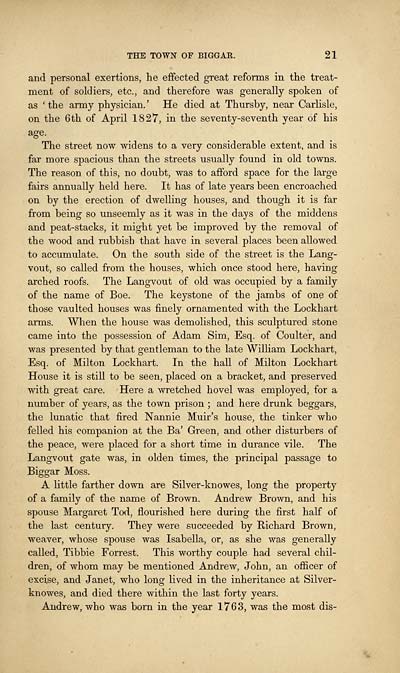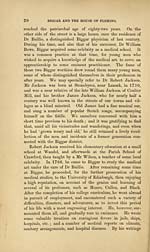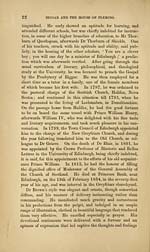Biggar and the House of Fleming
(41) Page 23
Download files
Complete book:
Individual page:
Thumbnail gallery: Grid view | List view

THE TOWN OF BIGGAR. 21
and personal exertions, he effected great reforms in the treat-
ment of soldiers, etc., and therefore was generally spoken of
as 'the army physician.' He died at Thursby, near Carlisle,
on the 6th of April 1827, in the seventy-seventh year of his
age.
The street now widens to a very considerable extent, and is
far more spacious than the streets usually found in old towns.
The reason of this, no doubt, was to afford space for the large
fairs annually held here. It has of late years been encroached
on by the erection of dwelling houses, and though it is far
from being so unseemly as it was in the days of the middens
and peat-stacks, it might yet be improved by the removal of
the wood and rubbish that have in several places been allowed
to accumulate. On the south side of the street is the Lang-
vout, so called from the houses, which once stood here, having
arched roofs. The Langvout of old was occupied by a family
of the name of Boe. The keystone of the jambs of one of
those vaulted houses was finely ornamented with the Lockhart
arms. When the house was demolished, this sculptured stone
came into the possession of Adam Sim, Esq. of Coulter, and
was presented by that gentleman to the late William Lockhart,
Esq. of Milton Lockhart. In the hall of Milton Lockhart
House it is still to be seen, placed on a bracket, and preserved
with great care. Here a wretched hovel was employed, for a
number of years, as the town prison ; and here drunk beggars,
the lunatic that fired Nannie Muir's house, the tinker who
felled his companion at the Ba' Green, and other disturbers of
the peace, were placed for a short time in durance vile. The
Langvout gate was, in olden times, the principal passage to
Biggar Moss.
A little farther down are Silver-knowes, long the property
of a family of the name of Brown. Andrew Brown, and his
spouse Margaret Tod, flourished here during the first half of
the last century. They were succeeded by Richard Brown,
weaver, whose spouse was Isabella, or, as she was generally
called, Tibbie Forrest. This worthy couple had several chil-
dren, of whom may be mentioned Andrew, John, an officer of
excise, and Janet, who long lived in the inheritance at Silver-
knowes, and died there within the last forty years.
Andrew, who was born in the year 1763, was the most dis-
and personal exertions, he effected great reforms in the treat-
ment of soldiers, etc., and therefore was generally spoken of
as 'the army physician.' He died at Thursby, near Carlisle,
on the 6th of April 1827, in the seventy-seventh year of his
age.
The street now widens to a very considerable extent, and is
far more spacious than the streets usually found in old towns.
The reason of this, no doubt, was to afford space for the large
fairs annually held here. It has of late years been encroached
on by the erection of dwelling houses, and though it is far
from being so unseemly as it was in the days of the middens
and peat-stacks, it might yet be improved by the removal of
the wood and rubbish that have in several places been allowed
to accumulate. On the south side of the street is the Lang-
vout, so called from the houses, which once stood here, having
arched roofs. The Langvout of old was occupied by a family
of the name of Boe. The keystone of the jambs of one of
those vaulted houses was finely ornamented with the Lockhart
arms. When the house was demolished, this sculptured stone
came into the possession of Adam Sim, Esq. of Coulter, and
was presented by that gentleman to the late William Lockhart,
Esq. of Milton Lockhart. In the hall of Milton Lockhart
House it is still to be seen, placed on a bracket, and preserved
with great care. Here a wretched hovel was employed, for a
number of years, as the town prison ; and here drunk beggars,
the lunatic that fired Nannie Muir's house, the tinker who
felled his companion at the Ba' Green, and other disturbers of
the peace, were placed for a short time in durance vile. The
Langvout gate was, in olden times, the principal passage to
Biggar Moss.
A little farther down are Silver-knowes, long the property
of a family of the name of Brown. Andrew Brown, and his
spouse Margaret Tod, flourished here during the first half of
the last century. They were succeeded by Richard Brown,
weaver, whose spouse was Isabella, or, as she was generally
called, Tibbie Forrest. This worthy couple had several chil-
dren, of whom may be mentioned Andrew, John, an officer of
excise, and Janet, who long lived in the inheritance at Silver-
knowes, and died there within the last forty years.
Andrew, who was born in the year 1763, was the most dis-
Set display mode to:
![]() Universal Viewer |
Universal Viewer | ![]() Mirador |
Large image | Transcription
Mirador |
Large image | Transcription
Images and transcriptions on this page, including medium image downloads, may be used under the Creative Commons Attribution 4.0 International Licence unless otherwise stated. ![]()
| Histories of Scottish families > Biggar and the House of Fleming > (41) Page 23 |
|---|
| Permanent URL | https://digital.nls.uk/94839774 |
|---|
| Description | A selection of almost 400 printed items relating to the history of Scottish families, mostly dating from the 19th and early 20th centuries. Includes memoirs, genealogies and clan histories, with a few produced by emigrant families. The earliest family history goes back to AD 916. |
|---|

